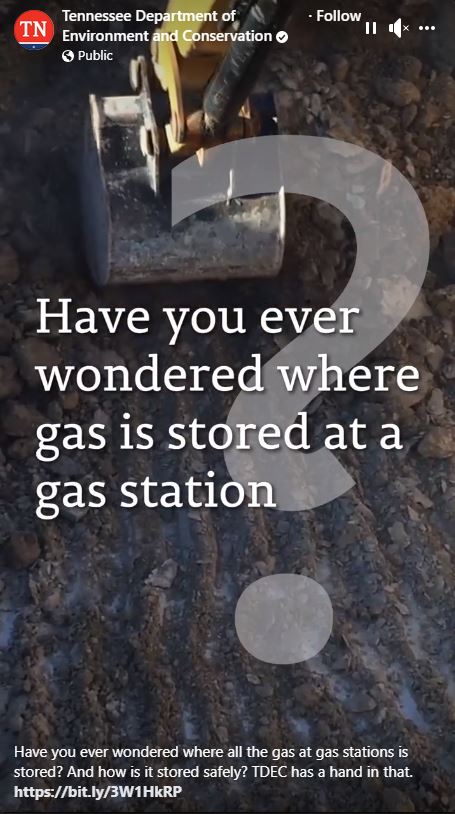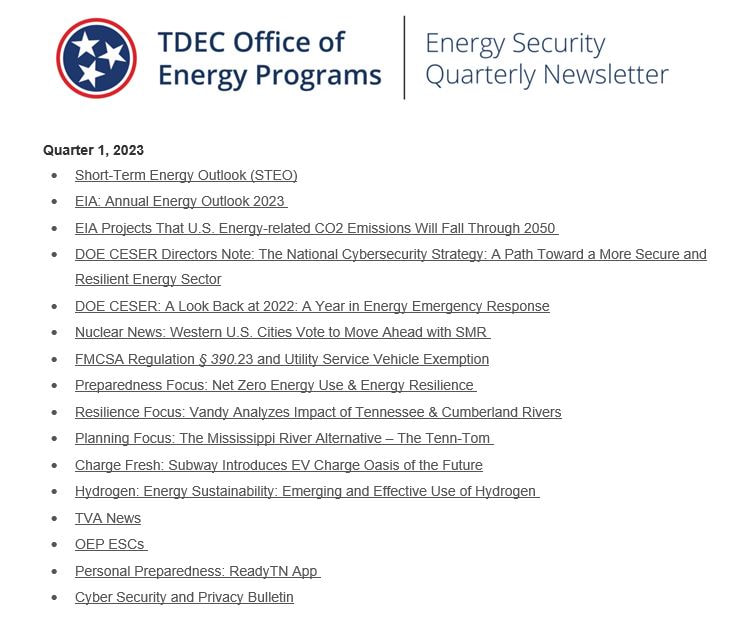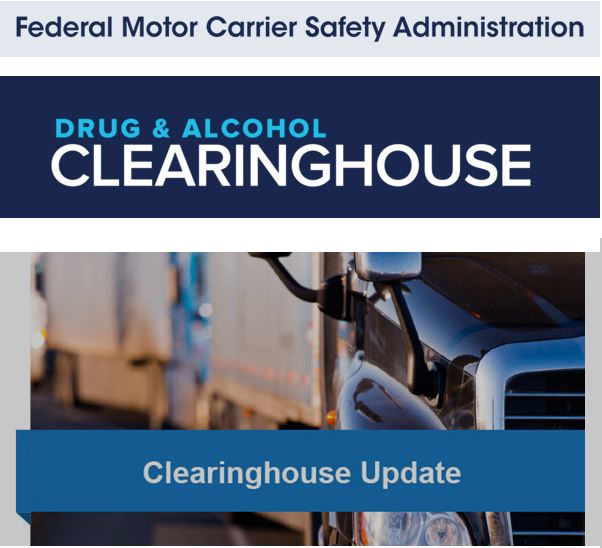|
News and Events
NEWS AND EVENTS U.S. Energy Secretary Drives Through TN on EV Road Trip Through the Southeast U.S. Energy Secretary Jennifer Granholm visited Tennessee as part of an electric vehicle (EV) road trip across four states in the Southeast to promote the current administration's climate policies, clean energy investments, and new jobs. In Chattanooga, the Secretary and White House Senior Advisor Mitch Landrieu visited the International Brotherhood of Electrical Workers with Mayor Tim Kelley to learn more about their apprentice program. After stopping for a fast charge in Jackson, the Secretary headed to Memphis, where she announced an award of $9.5 million under the Renew America’s Schools Program to Riverview PreK-8 school in South Memphis for a state-of-the-art STEM lab, upgraded HVAC system, energy-efficient lights, and eco-friendly windows. The Secretary also gave a Town Hall address at the National Civil Rights Museum in Memphis to highlight historic clean energy and infrastructure investments under the Infrastructure Investment and Jobs Act and the Inflation Reduction Act. Enchem Announces $152.5 Million Electrolyte Plant in Brownsville Governor Lee, Tennessee Department of Economic and Community Development Commissioner Stuart McWhorter, and Enchem America Inc. announced a $152.5 million electrolyte manufacturing plant in Brownsville at the I-40 Advantage Industrial Park. The facility will be Enchem’s second U.S. plant and will create 190 new jobs. The plant will manufacture electrolytes for EV batteries and other EV battery-related services. New Fast Charge TN Network Site Opens in Hohenwald Meriwether Lewis Electric Cooperative (MLEC) installed and commissioned two new fast chargers at its 28 S Park Avenue, Hohenwald office, near the convergence of U.S. Route 412 and Tennessee highways 20 and 48. This project was completed as part of the Fast Charge TN Network program, a partnership between TDEC and TVA to fund fast charging infrastructure along Tennessee’s interstates and major highways. Tennessee Featured in “Charging Toward Justice” Report A new report, Charging Toward Justice, which was published by Evergreen Collaborative and Atlas Public Policy, highlights best practices for complying with federal Justice40 goals in the deployment of EV fast charging infrastructure under the National Electric Vehicle Infrastructure (NEVI) program. Through the Justice40 initiative, the federal government has made it a goal that 40% of the overall benefits of certain federal investments flow to disadvantaged communities that are marginalized, underserved, and overburdened by pollution. The report summarizes recommendations for states in future years of the NEVI program on Justice40 community outreach. Tennessee is featured in the report for its outreach efforts conducted thus far, including social media campaigns, newspaper announcements, in-person engagement sessions, and easy-to-understand language used around the program to increase public comprehension and participation. On-Demand Microtransit in Memphis Memphis Area Transit Authority (MATA) has successfully utilized on-demand microtransit options over the past few years to address transportation access challenges. Both the Ready! and Groove On-Demand services use phone apps for riders to request pick up and drop off in locations throughout Memphis. Each service supports different areas of Memphis and has ride fares similar to standard MATA bus fares. Learn more about the Ready! program from the case study, Ready, Set, Go!: Using Microtransit to Overcome Transportation Barriers with MATA Ready!, Memphis, TN, published by the Shared-Use Mobility Center. Additional information on the Groove On-Demand program can be found here. Chattanooga Plans Autonomous Downtown Shuttle The City of Chattanooga and the Center for Urban Informatics and Progress (CUIP) at the University of Tennessee at Chattanooga plan to roll out an autonomous vehicle shuttle to carry passengers around the Smart City Corridor, a 1.2-mile section of roadway that utilizes innovative technologies, as well as throughout other parts of downtown. CUIP will also partner with TDOT to add sensors and technology to a 2.5-mile section of highway that connects to the testbed. Researchers are interested in how connected infrastructure, like that in the Smart City Corridor, can improve safety when riding in an autonomous vehicle downtown and on the highway. U.S. DOE Announces Clean Fuels & Products Shot U.S. DOE recently announced the Clean Fuels & Products Shot, which is focused on decarbonizing the fuel and chemical industry through alternative carbon sources to advance cost-effective technologies with a minimum of 85% lower greenhouse gas (GHG) emissions by 2035. This Shot supports the Sustainable Aviation Fuel Grand Challenge and aims to drastically decarbonize the transportation and chemical industries. The Clean Fuels & Products Shot could eliminate more than 650 million metric tons of carbon dioxide equivalent per year and significantly reduce GHG emissions. Learn more on the Clean Fuels & Products Factsheet and FAQs page. UPCOMING EVENTS EV Managed Charging Webinar U.S. DOE’s EVGrid Assist will host a webinar on EV Managed Charging on July 20 from 3 - 4 p.m. ET. The webinar will provide an overview of smart charge management for EVs, including U.S. DOE-supported national laboratory and industry research, development, and demonstration. Utility speakers will present two approaches to managing EV charging, and a panel discussion will address participant questions and inform and educate stakeholders. Register here for the webinar. Recordings of previous webinars are available at www.energy.gov/EVGridAssist. Alternative Fuel Life-Cycle Environmental and Economic Transportation (AFLEET) Tools Update Webinar Using the AFLEET suite of tools, fleet managers and planners can estimate the environmental and economic costs and benefits of alternative fuels and infrastructure. Join Argonne National Laboratory on August 9 at 2 p.m. ET to learn about AFLEET and its recent updates and how to navigate them. Updates regarding EV infrastructure include:
Register here for the webinar. Save the Date: STRIDE Collaborative 2023 Partners Meeting On September 20-21, STRIDE Collaborative will host the 2023 Annual Partners Meeting in-person in Atlanta, GA. The meeting will include partners from eight southeastern states in agriculture, construction, transportation, shipping, energy, and the environment. It will feature speakers on a variety of topics, including electrification, alternative fuels, funding for projects that reduce diesel emissions, and more. A pre-conference workshop will be held on September 19. Registration information will be coming soon. UPCOMING FUNDING OPPORTUNITIES EPA Clean School Bus Grant Program EPA’s 2023 Clean School Bus Grant Program will award approximately $400 million in competitive grant funding to eligible applicants for the purchase of zero-emission school buses, clean school buses, and zero-emission charging infrastructure. Funding is available for two sub-programs, the School District Sub-program for school districts and Tribal applicants and the Third-Party Sub-program for third-party applicants. EPA is prioritizing applications that will replace buses serving high-need local education agencies, rural areas, Tribal school districts funded by the Bureau of Indian Affairs, and public school districts receiving basic support payments for students living on Tribal land and rural areas. Though the CSB Program does not require grantee match or cost share, EPA has indicated that applicants demonstrating the commitment of other funding sources to reduce the federal cost for projects to below 100% will have their proposals more favorably evaluated. TDEC is committing a portion of the State’s Volkswagen Settlement Environmental Mitigation Trust (EMT) allocation to support Tennessee school districts and other eligible entities improve the competitiveness of their applications and maximize the amount of federal funds that may be granted to Tennessee entities under the CSB Program. Applications close on August 22 and must be submitted through Grants.gov. Multiple informational webinars are available, including upcoming webinars from the U.S. EPA and recorded video modules from the Clean Cities Coalition. Additional resources are available on the Clean School Bus Grant Program website. For more information about the program, sign up for Clean School Bus Program news or contact [email protected]. PROTECT Discretionary Grant Program The Federal Highway Administration’s Promoting Resilient Operations for Transformative, Efficient, and Cost-Saving Transportation or PROTECT Discretionary Grant Program funds projects that can improve the resilience of the surface transportation system by reducing flood risks, erosion, wave damage, and heat impacts. The program aims to minimize damage and disruption to the transportation system, improve traveling public safety, and improve equity. The development or deployment of EV charging infrastructure along evacuation routes is an eligible expense under the PROTECT program. Additional information is available on the Notice of Funding Opportunity and the PROTECT Discretionary Grant Program Fact Sheet. Eligible entities include all levels of government. Applications are due August 18. Coming Soon: TennSMART Open Innovation Challenge This summer, TennSMART launched the Open Innovation Challenge program to support the growth and development of the smart mobility industry in Tennessee. The program catalyzed innovation by coupling established businesses with founders to create solutions for technology and operational gaps, as many large, established businesses lack the operational capacity and personnel to keep up with innovation demands. The program starts with a company acknowledging a technology gap in its operational capacity or product offering. That gap is then presented to an engaged team of entrepreneurs. Over the course of four weeks, the founder “think tank” will work to create a viable and marketable technology solution to respond to the innovation need(s) expressed by the participating company. Presentations will be pitched following this four-week period for consideration by the company’s representative and a group of investors. Contact Bryan Barringer at [email protected] to learn more about this program. RESOURCES AND GUIDES
NEVI Formula Program Annual Report The Joint Office of Energy and Transportation (Joint Office) released the National Electric Vehicle Infrastructure (NEVI) Formula Program Annual Report for Program Year 2022–2023. The report summarizes the key activities of the Joint Office with the NEVI Formula Program and provides individual and collective overviews of the first-year deployment plans. All NEVI deployment strategies include designated portions of the National Highway Systems as Alternative Fuel Corridors, covering roughly 75,000 miles, and prioritize build-out along the Interstate Highway System. Charging Forward Toolkits for Urban and Rural EV Infrastructure The Joint Office of Energy and Transportation has released Charging Forward: A Toolkit for Planning and Funding Urban Electric Mobility Infrastructure and an updated Charging Forward: A Toolkit for Planning and Funding Rural Electric Mobility Infrastructure. The technical resources aim to help communities take full advantage of federal funding for EV charging stations and other forms of electric transportation by including information on how to scope, plan, and identify ways to best leverage funding.
By Jeff Lenard
There is no “average” fuel retailer, so all the costs that go into a gallon of gas vary from station to station. November 12, 2021 Most people think convenience stores and gas stations make a lot of money selling gas—and even more money when prices rise. In fact, a stunning 45% of drivers think that retailers make at least $2 a gallon in profit per gallon, according to a NACS consumer survey. On Friday, November 5th, the House passed H.R. 3684: The Infrastructure Investment and Jobs Act, more commonly known as the Bipartisan Infrastructure Act (BIF). It had already passed through the Senate with a 69-30 vote before being decided on in the House with a 228-206 vote. The legislation is expected to be on President Biden’s desk this week to be signed into law.
The legislation will reauthorize surface transportation programs for five years and provide funding authorization for energy, water, and broadband infrastructure. It would increase spending on infrastructure by $550 billion over five years and appropriate $445.9 billion in emergency funding. This legislation is a major part of President Biden’s agenda to build stronger infrastructure while providing job opportunities. The White House released the following fact sheet on the bill. A summary report released by Senator Rob Portman can be found here, and a section-by-section released by Senator Joe Manchin can be found here. While the bill covers a myriad of infrastructural investments, the bill is centered around the reauthorization of surface transportation programs, starting with highways. According to Bloomberg Government, the following measures have been included in the bill relating to highways: |







